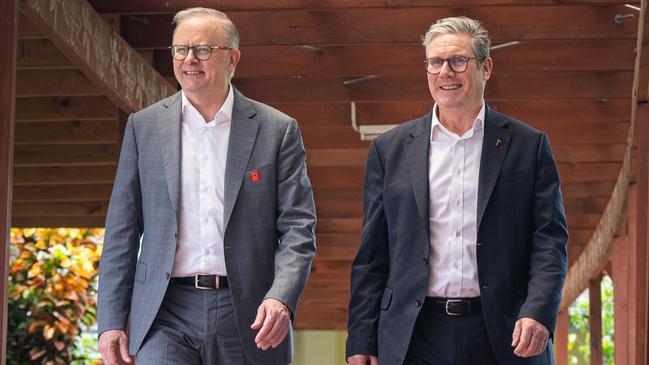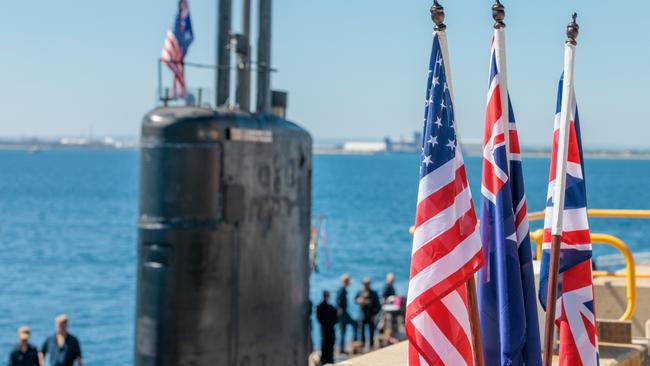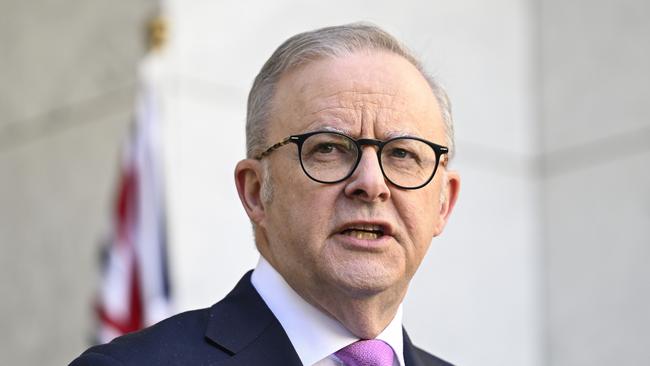PM defends AUKUS timeline after UK pledges massive fleet expansion
Anthony Albanese has been grilled on when Australia can expect its fleet of nuclear-powered submarines after a shock move from the UK.
Breaking News
Don't miss out on the headlines from Breaking News. Followed categories will be added to My News.
Anthony Albanese has been forced to defend AUKUS’ snail pace after his British counterpart said the UK would build up to 12 new nuclear-powered boats under a plan to rapidly bolster its “war-fighting readiness”.
Keir Starmer on Monday announced the UK would build the new attack submarines as part of AUKUS and pledged to hike defence spending to 3 per cent of GDP by 2029, including a £15bn ($31.3bn) boost to its nuclear warhead program.
The British Prime Minister cited “war in Europe” and a “new era of threat”.
The submarines would enter service by the late 2030s.
Meanwhile, Australia is expected to acquire its first American-made Virginia Class nuclear-powered submarine “as soon as the early 2030s”, while the first Australian-made boat would not be finished until the 2040s.

Mr Albanese on Tuesday shrugged off questions about whether Australia should act “in line with their allies”.
“What, with the UK? The UK’s in a different place from Australia,” Mr Albanese told reporters in Perth.
Pressed on when Australia would get its submarines, he said Australia would “determine our policy here”.
“We’re a sovereign nation that needs to have pride in our sovereignty and in our capacity to make decisions in our national interest,” Mr Albanese said.
Pressed further, he insisted his government had a “plan in place”.
“We have a plan, that is for the visiting of submarines from the US and the UK,” Mr Albanese said.
“We also have a plan for Virginias to come here in the 2030s, and we have a plan for manufacturing here as well.”

He also defended Labor’s defence budget target of 2.3 per cent of GDP by 2033 despite calls from Washington to hike it to 3.5 per cent and defence analysts calling for more cash to strengthen Australia’s immediate combat readiness.
“Our goal is to give Australia the capability that it needs,” Mr Albanese said.
“We saw during the election campaign the alternative approach, which was a Coalition that announced $21bn of spending – they couldn’t say where the money was coming from or what it was for.
“If people think that’s a good idea, that’s one road to go down.
“The other road … is identify what’s the capability that we need and to provide that investment.”
He added that investing in “relationships in the region” was also “pretty important”.

“That’s why, when I was in Indonesia, my first visit, not by accident, our near neighbours, where we are in this region, sitting down with President Prabowo, talking about our defence relationship there as well,” Mr Albanese said.
“So we’ll continue to invest in our capability and in our relationships.”
Australia’s military budget came up in a bilateral talks between Defence Minister Richard Marles and his US defence counterpart Pete Hegseth on the sidelines of the Shangri La Dialogue in Singapore at the weekend.
In a read out, the US Embassy said the two senior officials “discussed aligning investment to the security environment in the Indo-Pacific, accelerating US force posture initiatives in Australia, advancing defence industrial base co-operation, and creating supply chain resilience”.
“On defence spending, Secretary Hegseth conveyed that Australia should increase its defence spending to 3.5 per cent of its GDP as soon as possible,” the embassy said.
My first bilateral meeting at the 2025 Shangri-La Dialogue was with @SecDef, our second catch up since he stepped into the role earlier this year.
— Richard Marles (@RichardMarlesMP) May 30, 2025
We discussed avenues for further economic and security cooperation, and our unwavering commitment to the Indo-Pacific. pic.twitter.com/NAoLPx53te
Mr Hegseth used his address at the Shangri La Dialogue to warn of an “imminent” threat from China, saying Beijing could invade Taiwan as early as 2027.
Such a move would deal a major blow to global supply of semiconductors and likely massively disrupt vital trade routes.
“Let me be clear, any attempt by Communist China to conquer Taiwan by force would result in devastating consequences for the Indo-Pacific and the world,” Mr Hegseth told the conference.
“There’s no reason to sugar-coat it. The threat China poses is real and it could be imminent.
“We hope not but certainly could be.”
Originally published as PM defends AUKUS timeline after UK pledges massive fleet expansion


